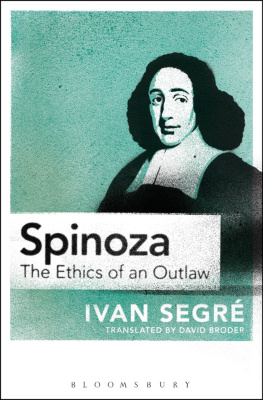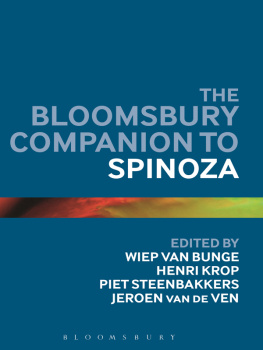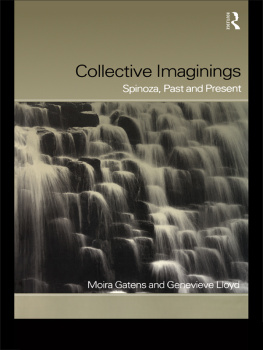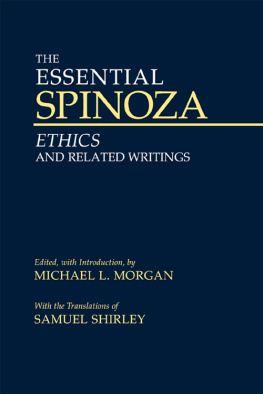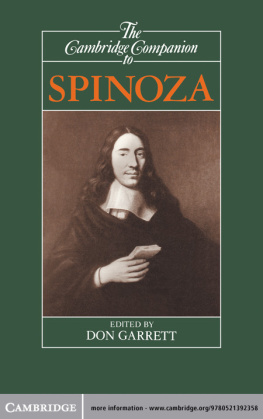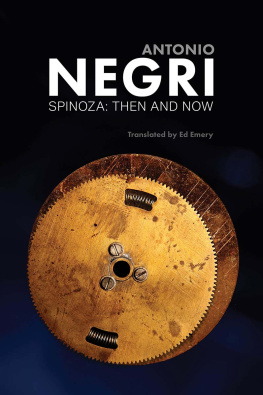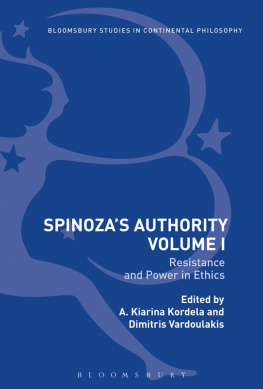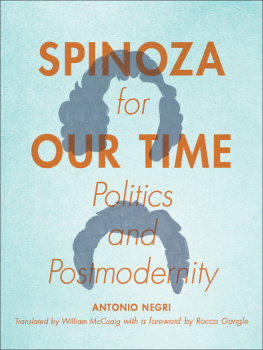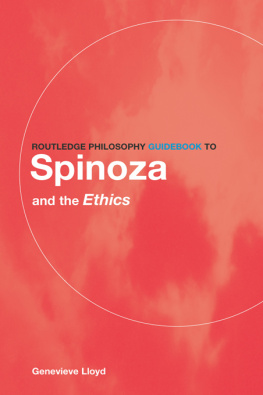SPINOZA
ALSO AVAILABLE FROM BLOOMSBURY
Philosophy for Non-Philosophers , Louis Althusser
Being and Event , Alain Badiou
Conditions , Alain Badiou
Infinite Thought , Alain Badiou
Logics of Worlds , Alain Badiou
Theoretical Writings , Alain Badiou
Theory of the Subject , Alain Badiou
From Communism to Capitalism , Michel Henry
Seeing the Invisible , Michel Henry
Lines of Flight , Flix Guattari
After Finitude , Quentin Meillassoux
Time for Revolution , Antonio Negri
The Five Senses , Michel Serres
Statues , Michel Serres
Rome , Michel Serres
Geometry , Michel Serres
Art and Fear , Paul Virilio
Negative Horizon , Paul Virilio
Althussers Lesson , Jacques Rancire
Dissensus , Jacques Rancire
Politics of Aesthetics , Jacques Rancire
The Lost Thread , Jacques Rancire
SPINOZA
The Ethics of an Outlaw
Ivan Segr
Translated by David Broder
Bloomsbury Academic
An imprint of Bloomsbury Publishing Plc
CONTENTS
T his book, in your hands, was first published by La Fabrique in Paris in 2014. Its original title was Le manteau de Spinoza: Pour une thique hors la loi (Spinozas Coat: For An Outlaw Ethics). Ivan Segr explains this reference, absent from the title of the English edition, in his Epilogue. The hole in Spinozas coat was a lasting mark of an attempt on the philosophers life. More than that, it symbolized the bourgeois hatred for the act of knowledge. This is precisely the hatred aroused by Spinozas outlaw ethics: the subject of this book.
*
Throughout the present translation we cite Spinozas Theoretical-Political Treatise (Tractatus Theologico-Politicus , TTP ) from the 2007 Cambridge University Press version, edited by Jonathan Israel and translated by Michael Silverthorne and Jonathan Israel. However, we will also refer to a series of French translations that Segr references and indeed compares, including Charles Appuhns translation Trait thologico-politique (Paris: Garnier, 1965) as well as other versions by Madeleine Francs and Robert Misrahi (Paris: Gallimard, 1954) and Jacqueline Lagre and Pierre-Franois Moreau (Paris: PUF, 1999).
David Broder, Rome, May 2016
S pinoza had a hole in his coat. Someone tried to stab him and his coat bore the mark of the attack. It became Spinozas coat.
In the Hebrew Bible, the clothing covering up mans nudity has a history. It starts with Adam and Eve. After they fell into sin, they discovered that they were naked and they sewed together a loincloth made of fig leaves. The story continues with Noah. Having arrived off the Ark, Noah planted a vineyard, got drunk and let his guard down as he fell asleep naked in his tent. Ham, meaning heat in Hebrew the bad son, the wicked man discovered his father naked in the tent and went to tell his brothers about it. (According to one Talmud scholar, the wording implies that he raped his father; another says that Ham raped and castrated him.) Shem name in Hebrew together with his other brother Yaphet beauty got a robe and went into the tent facing backward in order to cover up their fathers nudity: mans nudity. This is the garment that Jacob later gives to Joseph. It is the bloodied tunic that Jacobs sons bring back to their father after selling their brother as a slave.
The Law is a sleeping, naked signifier. The wine is the hidden meaning, the secret; the tent is a study hall. And there are two practices of exegesis. One corresponds to Ham , the heat; and then there is another that corresponds to Shem , the name. When Yaphet associates with Ham , sophistication makes a pact with violence; when he associates with Shem , it is the idea that regulates sophistication.
Jean-Claude Milner, a theorist of the name Jew, wrote the following in a book dedicated to May 1968:
Will anyone dare say out loud that the only true event of the twentieth century was the return of the name Jew? With its corollary: the disappearance of the name worker. () The conclusion? When we exalt the name worker we are necessarily engaging in a denial: leaving aside the cradle of infantile regression, we have but one purpose, namely to deny what is in order to explain what is not .
Lets take Milners conclusion as a hypothesis. Lets say that the return of the name Jew, such as the bourgeois theorists conceive it, has a certain function, namely to forbid our modernity. So on the one hand, there is rationalist philosophy, and revolutionary politics on the other. Or, to put that another way, the return of the name Jew has its corollary in the disappearance of the name worker. Of course we need to re-establish some missing links in order to bring this correlation into view. The first of these links is a text of St Pauls. In his Letter to the Ephesians , where he addresses the reconciliation of the Jews and the pagans by the Cross, we read
For he is our peace, who hath made both one, and hath broken down the middle wall of partition between us; Having abolished in his flesh the enmity, even the law of commandments contained in ordinances; for to make in himself of twain one new man, so making peace; And that he might reconcile both unto God in one body by the cross, having slain the enmity thereby.
In their notes, the authors of the Traduction cumnique de la bible [TOB; 19756, Ecumenical Translation of the Bible] explain that this Law of commandments and ordinances is the Law of Moses, which made the Jews a privileged people, separating them from the pagans. Jesus did away with this law, fulfilling it once and for all by his Cross. Christ did away with the partition of enmity by fulfilling the Law through his loving sacrifice. That is the Christian argument; that is the mystery of the blood of Christ. The crucifixion fulfilled the Law of Moses as symbolized through circumcision, and thus did away with the partition that prevents humanity by dividing humanity. If the name Jew is a cause of hatred, that is because it erects an obstacle to the advent of an egalitarian universality; because it forbids it.
Lets now introduce the second link in the chain. It is an extract from Marx and Engelss The German Ideology :
If power is taken as the basis of right, as Hobbes, etc., do, then right, law, etc., are merely the symptom, the expression of other relations upon which state power rests. The material life of individuals, which by no means depends merely on their will, their mode of production and form of intercourse, which mutually determine each other this is the real basis of the state and remains so at all the stages at which division of labour and private property are still necessary, quite independently of the will of individuals. These actual relations are in no way created by the state power; on the contrary they are the power creating it. The individuals who rule in these conditions leaving aside the fact that
In analysing the power relations, class relations and inegalitarian base that together determine the Law, Marx and Engels desacralize and ultimately pull it apart. They then go on to herald the kingship of the names worker, proletarian and communist: the names of another law immanent to the emancipation process and the revolutionary becoming.
Milner concludes that the return of the name Jew has its corollary in the disappearance of the name worker. This is logically coherent, if the name Jew does indeed symbolize the partition effected by the Law; if through circumcision the Jew embodies this barrier. So the return of the name Jew forbids the revolutionary becoming of the name worker, or at the very least sets up a barrier to its royalty.

